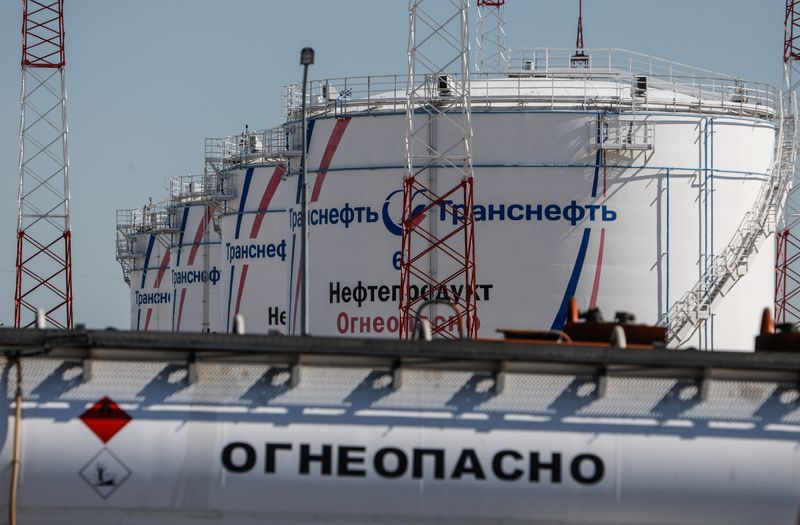By Julia Payne and Nidhi Verma
LONDON/NEW DELHI/MOSCOW (Reuters) -The Group of Seven (G7) nations' proposed price cap of $65-$70 a barrel on Russian oil would have little immediate impact on Moscow's revenues, as it is broadly in line with what Asian buyers are already paying, five industry sources with direct knowledge of the purchases said on Wednesday.
The goal of the price cap is to deprive Russian President Vladimir Putin of revenue to fund the military offensive in Ukraine, without causing major disruption to global oil markets that would drive energy prices higher.
Oil and gas exports are forecast to account for 42% of Russia's revenues this year at 11.7 trillion roubles ($196 billion), according to the country's finance ministry, up from 36% or 9.1 trillion roubles ($152 billion) in 2021.
The G7, including the United States, as well as the whole of the European Union and Australia, are planning to implement the price cap on sea-borne exports of Russian oil on Dec. 5.
India has emerged as the second-largest single buyer after China of Russian oil since the conflict began in February. Indian refiners have taken the place of refiners in countries that have imposed sanctions on Russian crude imports, or have steered clear of Russian crude to avoid negative publicity.
Some Indian refiners are paying the equivalent to a discount of around $25 to $35 a barrel to international benchmark Brent crude for Russian Urals crude, two sources said. Urals is Russia's main export crude.
With Brent trading at around $85 a barrel on Wednesday, that would imply a price of $50-$60 a barrel of Urals, which is below the cap.
That would indicate Western shippers and insurers living in countries that have imposed sanctions on Russia would be able to provide services to cover shipments of Russian crude without fear of being sanctioned.
It also means that Russia would not need to make good on its threat to stop supplying buyers that adhered to the price cap - because the market is below that cap anyway.
The U.S. Treasury guidance published on Tuesday said the cap will be placed on what are known as Free on Board (FOB) prices, which do not include the cost of insurance and shipping. That would be the price that the crude would be sold at if a buyer went and picked it up from a Russian terminal.
Indian refiners typically pay for crude to be delivered to them. That price includes insurance and freight.
Even for delivered Urals crude, India is paying $15-$20 a barrel below Brent, one source said. That means even the delivered cargoes are about the same level as the price cap.
Urals is trading to other buyers at a similar discount of $30-$35 to dated Brent, trading sources said. Oil produced by the sanctioned state oil firm Rosneft is at the lower end and non-Rosneft slightly higher.

The U.S. Treasury guidance does not allow buyers in countries that have imposed sanctions on Russian crude imports, such as in the United States and the European Union, to buy Russian oil even under the price cap.
($1 = 59.8000 roubles)